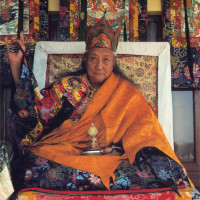Those who practice the Dharma of the Mahayana in accordance with the Buddha’s intention are known as bodhisattvas. If you practice the teachings of the Mahayana, you can reach the level of the great bodhisattvas Avalokiteshvara and Manjushri, in the best case, or become like the Buddha’s two main disciples Shariputra and Maudgalyayana, who were gifted with insight and miraculous powers.
Even if you are unable to practice to the full in this life, you will at least be reborn among the principal disciples of the future Buddha, Maitreya. The buddhas being those who have totally conquered the enemies of ignorance and the other emotions, they are often referred to by the synonym ‘Victorious Ones,’ while bodhisattvas, in many texts including the Tibetan original of the root verses of these teachings, are called ‘children of the Victorious Ones’.
Who, then, are the children of the buddhas? In the case of Buddha Shakyamuni, the child of his body was his physical son, Prince Rahula. The children of his speech were all those who heard him teach and attained the level of arhart – the great beings such as Shariputra, Maudgalayana, the sixteen arhats and others, who became the holders of his teachings.
Above all, the children of the buddha’s mind are the great bodhisattvas like Avalokiteshvara and Manjushri, who carry out their noble intention to bring all beings to enlightenment.
For, just as a great monarch with a thousand children would choose the one with the most perfect qualities to be his heir, so, too, a buddha regards as his authentic heirs the bodhisattvas who have perfected the union of wisdom and compassion.

Dilgo Khyentse Rinpoche
from the book The Heart of Compassion: The Thirty-seven Verses on the Practice of a Bodhisattva
Read a random quote or see all quotes by Dilgo Khyentse Rinpoche.
Further quotes from the book The Heart of Compassion:
- Practice day and night
- Two types of friends
- Seeing clearly how deceiving the ways of the world are
- Cutting through subtler misconceptions
- Just projections of the mind
- Protecting ourselves from future suffering
- Impermanence dawning in your mind
- A practice based on your mind
- The three aspects of diligence
- Opportunity
- The magnifying glass of your faith and devotion
- I like suffering
- The best opportunity to put the teachings into practice
- Meaningless activities without end
- Nothing to be grasped
- No greater obstacle to Dharma practice
- Start observing your mind
- Before it is too late
- Never stop thinking about how to gain liberation